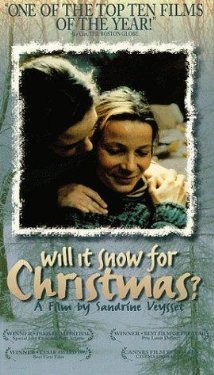“The Consequence of Bad Choices”

| None | Light | Moderate | Heavy | |
|---|---|---|---|---|
| Language | ||||
| Violence | ||||
| Sex | ||||
| Nudity |
What You Need To Know:
WILL IT SNOW FOR CHRISTMAS? is a French movie with subtitles which depicts a mother and her seven illegitimate children living in an old farmhouse in southern France. They work the farm and serve their father, who has a wife and home elsewhere. The children hate their father and want to leave, but the mother does not know how to survive otherwise. The hardships of farm life, painful relationships and poverty are portrayed. The film documents the family’s travails from spring through Christmas. As time marches on, hopelessness develops.
The premise of this movie is that bad choices produce bad consequences which hurt others, who may be innocent. The biblical concept of reaping what we sow is portrayed, as well as the “sins of the father” being visited on later generations. Although these realities are portrayed, there is no biblical offering of redemption or restoration. A particularly offensive part of the movie is when the father tries to rape his own daughter. The movie drips with immorality and adultery, and while the negative consequences of these actions are portrayed, they are never identified as morally wrong choices. WILL IT SNOW FOR CHRISTMAS? Will not be of interest to most Americans, moral or otherwise.
Content:
(Ro, C, LL, VV, SS, N, A) Romantic worldview with some Christian elements; 12 obscenities & 1 vulgarity; brief violence including man hitting mistress & mother in despair tries to kill self & 7 children by gassing; woman living in an adulterous situation with a married man, implied sexual advance & attempted rape by a father of his daughter, implied adultery; naturalistic nudity of children; and, alcohol.
More Detail:
WILL IT SNOW FOR CHRISTMAS is a French film with subtitles depicting a mother (Dominique Reymond) and her seven illegitimate children living in an old farmhouse in southern France. They work on the farm in exchange for the right to live there and serve their father, who has a wife and home in Cavaillon, France. The children hate their father and want to leave, but the mother does not know how to survive otherwise. The hardships of farm life, painful relationships and poverty are portrayed. The film documents the family’s travails from spring through Christmas.
The mother works hard to do her best for her children and obviously cares for them. She sacrifices to buy presents for Christmas and gives up their labor in order to send them to school. She mediates between them and their verbally abusive father and seeks to protect her children from him. Although her son begs her to take them all away, she does not think she can survive anywhere else. When the cold of winter arrives, their father will not even allow them extra wood for warmth, as he is taking it to his legitimate family. The mother is increasingly consumed by hopelessness and despair.
The premise of this movie is that bad choices produce bad consequences which hurt others, who may be innocent. In this case, the mother, living in an orphanage after losing her family in a war, falls in love with a married man and chooses to live with him on his farm and work it with him. What once was an escape becomes its own prison. Their illegitimate children bear the consequences by working the farm and enduring their cruel father. The biblical concept of reaping what we sow is portrayed, as well as the “sins of the father” being visited on later generations.
Although these realities are portrayed, there is no biblical offering of redemption or restoration. A particularly offensive part of the movie is when the father tries to rape his own daughter. This moves the mother to an adversarial position with the father. The resolution is seen in the mother’s attempt to give her children one last Christmas party and then to kill them along with herself. They are saved from death by the Christmas snow.
The movie drips with immorality and adultery, and while the negative consequences of these actions are portrayed, they are never identified as morally wrong choices. The mother appears trapped in the situation, since the father threatens her with violence if she attempts to leave, yet she does not lament her choices or attempt to teach her children to choose more wisely.
Without a living faith this woman is lost. In the Bible (see for example 1 Kings 17:12), God cares for the poor widow in their distress, whereas this woman has no such hope.
The hero of the movie is the mother, as she attempts to nurture her children in spite of an abusive environment. She struggles and sacrifices for them, and they love her for it. They shower her with affection and view her as their beacon of hope. The villain is the father, whose lack of commitment, abusiveness and repeated sexual affairs ravage the family. He provides for his legitimate wife and refers to his mistress as his “whore.” Love is depicted as feeling, rather than a commitment. “Mum” claims to love the children’s father, but she admits that this love traps her in an abusive situation. Her love reduces her and her children to slave labor and is based on the memory of feelings that once were. Her love for her children is more positive, as she attempts to be an advocate for them to their father and sacrifices to afford them an education.
Dominique Reymond does an excellent acting job as the mother, and the seven children also perform well. The cinematography was well laid out and planned with some foresight into the desired effect that would be achieved with the audience. However, it appears that the equipment used was inferior. At one point, an indoor shot was filmed with a very noisy camera, audible to the audience.
WILL IT SNOW FOR CHRISTMAS may be of some interest to those who enjoy French movies, but it is not of general interest to most Americans, moral or otherwise.


 - Content:
- Content: 

